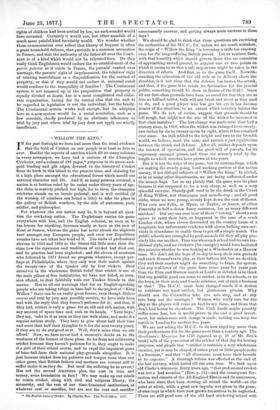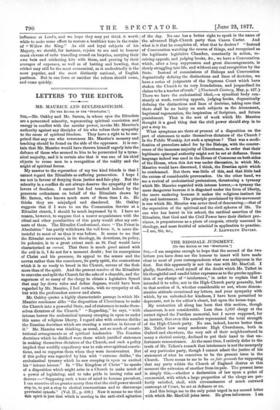" WILLOW THE KING."
IN the past fortnight we have had more than the usual evidence that the hold of Cricket on our people is at least as firm as ever. Besides the reports of matches which fill so many columns in every newspaper, we have had a cartoon of the Champion Cricketer, and a volume of 496 pages,* gorgeous in its green-and- gold binding and gilt edges, devoted to the history of Cricket from its birth in this island to the present time, and claiming for it a high place amongst the educational forces which mould our national character and life. And if, as many persons contend, a nation is at bottom ruled by its males under thirty years of age, the claim is scarcely pitched too high, for to these the champion cricketer stands on an heroic pedestal, and is well entitled (if the worship of numbers can found a title) to take his place in the gallery of British worthies, by the side of statesman, poet, soldier, and philosopher.
For whatever else our nation may be, it is beyond all ques- tion the cricketing nation. The Englishman carries his game everywhere with him, and the English colonist, as soon as he has leisure for anything, becomes nearly as keen as the men of Kent or Sussex, whereas the game has never struck the slightest root amongst any European people, and even our Republican cousins have not taken fair hold of it. The visits of professional elevens in 1859 and 1868 to the States did little more than dis- close how the mysteries and traditions of cricket had died out, and its practice had been neglected ; and the eleven of amateurs who followed in 1871 found no progress whatever, except per- haps at Philadelphia, where they only won their match against the twenty-two of the Quaker city by four wickets. Bred ourselves; in the wholesome British belief that cricket is one of the main pillars of free institutions, we have not failed, as occa- sion offered, to deal faithfully with our Yankee friends in this matter. But to all our warnings that for an English-speaking people who are taking refuge in base-ball to the neglect of " King Willow" there can be no really great future, even though Habeas corpus and trial by jury may possibly survive, we have only been met with the reply that they haven't patience for it ; and that, if they had, cricket is only a game for an old and rich nation, with any amount of spare time and cash on its hands. Your boys,' they say, 'take to it as soon as they can walk alone, and make it a regular serious study. They have to give about half their time and more than half their thoughts to it for the next twenty years, if they are to do any good at it. Well, that's more than we can afford.' Now, we have never had a moment's doubt as to the weakness of the former of these pleas. So far from not cultivating cricket because they haven't patience for it, they ought to make it a part of their school course, and to expel the impatient game .of base-ball from their national play-grounds altogether. It is just because cricket does try patience and temper more than any eother game, that British fathers and mothers are content still to suffer under it as they do. But need the suffering be so severe? Has not the second American plea, the cost in time and money, some foundation in fact? We may make up our minds ito retain cricket, along with civil and religious liberty, the monarchy, and the rest of our time-honoured institutions, at whatever cost or sacrifice, but are not the cost and sacrifice
• The English Claw of Cricket. By Charles Box. The Field Office. 1877.
unnecessarily onerous, and getting always more onerous in these days ?
We should be glad to think that these questions are exercising the authorities of the M.C.C., for, unless we are much mistaken, the reign of " Willow the King " is becoming a trifle too exacting even for the long-suffering British parent. Let us venture, then, with that humility which should govern those who are conscious of approaching sacred ground, to suggest one or two points on which it seems to us that a safe step or two might be taken in the direction of reform. And first, as to the game itself. Notwith- standing the relaxation of the old rule as to delivery above the shoulder, is it not clear that the defence has beaten the attack, and that, if the game is to retain its fascination for the general public, something should be done in favour of the field ? Since all our first-class grounds have been so cared for that they are as true as billiard-tables, balls will not break and shoot as they used to do, and a good player who has got his eye in has become master of the situation, to an extent which certainly injures the game. We do not, of course, suggest that grounds should be left rough, but might not the size of the wicket be increased in first-class matches ? The last change was made more than half a century since, in 1818, when the wicket was enlarged from twenty- two inches by six to twenty-seven by eight, where it has remained ever since. Au inch added to the height and two to the breadth would, we believe, meet the case, and restore a just equilibrium between the attack and defence. After all, cricket depends upon the interest of spectators, and the good-will of parents, for its supremacy amongst games, and these are severely tried by the length to which matches have grown of late years.
But it is not the rules of the game, but its surroundings, which are making the steady-going, bard-working portion of this nation uneasy, if not disloyal subjects of " Willow the King." In cricket, as in so many other departments, we are being suffocated under the money-bags. Let us say plainly that the game won its place because it was supposed to be a very cheap, as well as a very splendid exercise. Shandy-gaff used to be the drink at the Court of King Willow, not champagne and moselle-cup ; and all good clubs, when we were young, sternly kept down the cost of dinner. Who ever saw Felix, or Mynn, or Taylor, or Anson, or either Ponsonby in half a dozen fancy costumes, for as many different matches ? Did any one ever hear of their " toteing " about a man apiece to carry their bats, as happened in the case of a crack London club, whose eleven descended on the country house of a hospitable but unfortunate cricketer with eleven hulking men-ser- vants in attendance to enable them to get off a simple match. The public schools are strangled by professionals till they all play pre- cisely like one another. Time was when each school had its own tra- ditional style, and no cricketer (for example) would have hesitated five minutes whether he was looking at a Winchester or a Harrow team. We don't ask the boys of to-day to keep their own grounds and teach themselves to play, as their fathers did, but we do think they and their masters might do something to brace the system. Can any real lover of the game have come away for years past from the Eton and Harrow match at Lord's so deluded as to think that any possible good can come to cricket, or to the schools, or to the boys, or their male and female relatives, out of such a business as that ? The M.C.C. must have changed much, if it desires to cultivate not hard cricket, but gluttonous picnics. Why should not the Committee take one safe step, and at any rate keep out the carriages ? Women who really care for the play or the players will come on foot to see them, and those that don't had better be elsewhere. The Club funds might possibly suffer some loss, but it would prove in the end a good invest- ment, for unless some such change is made, nothing can keep the match in London for another five years.
We are not asking the M.C.C. to do now anything more than their predecessors did for the game more than a century ago. The Gentleman's Magazine for 1743 (quoted at p. 21 of Mr. Box's book) tells of the perversion of the cricket of that day for betting purposes, and pleads that " cricket is certainly a very wholesome exercise, yet it may be abused, if either great or little people make it a business," and that " all diversions must have their bounds as to expense." A thorough reform was effected at the end of the last century, which lasted till our own time. We look upon old Clarke's discovery, thirty years ago, " that professional cricket was not a bad vocation" (Box, p. 51)—and the consequent for- mation and circuits of the All-England Eleven and its successors, who have since then been starring all round the world—as the point at which, while a great new impulse was given to the game, abuses crept.in which have now grown too serious to be neglected. There are still good men of the old hard cricketing school with
influence at Lord's, and we hope they may yet think it worth while to make some effort to restore a healthier tone in the realm of " Willow the King." As old and loyal subjects of his Majesty, we should, for instance, rejoice to see and to honour crack elevens of colts travelling round on bicycles, carrying their own bats and cricketing kits with them, and proving by their averages of expenses, as well as of batting and bowling, that cricket may still be the most economical, as it undoubtedly is the most popular, and the most distinctly national, of English pastimes. But in one form or another the reform should come, and come quickly.



































 Previous page
Previous page